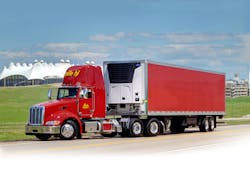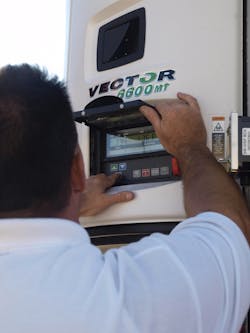Mile Hi savings
Food distribution has been the business of the Taddonio family for a very long time. It was 1901 when Michael Taddonio arrived in Denver and began selling fruits and vegetables from a horse-drawn cart. It was the 1940s when his children established Taddonio Brothers Produce with one truck. Soon after, Mile Hi Fruit & Vegetable was in business selling produce to restaurants and grocery stores.
Tony Taddonio serves as CEO of the family-owned specialty food service company that supplies more than 300 national brand restaurants, making daily deliveries of food, paper and refrigerated products.
The Mile Hi Foods distribution fleet, which numbers 75 tractors and 150 refrigerated trailers, serves customers and operates under separate 48-state authority as a contract carrier for backhauls. Today, Taddonio notes, the company faces several ongoing challenges. Those include the need to find and retain qualified drivers, to meet customer demands driven in part by new food safety regulations, and to hold the line against high and rising fuel costs while simultaneously making environmentally sound choices.
“We’ve invested in technologies that help us better manage our operation,” Taddonio says. “Our tractors have XRS mobile technology platforms for vehicle tracking and communication and for monitoring performance parameters. Trailers are equipped with the ibright telematics system for location data and cargo temperature monitoring.”
Recently, Mile Hi Foods received a Green Fleet Award from the Colorado Motor Carriers Assn. for its environmental efforts. The award cited the company’s use of Rocky Mountain doubles, its fleet of SmartWay-certified Peterbilt tractors, and its adoption of Carrier Transicold hybrid diesel-electric refrigeration units with electric standby capability.
For the past three years, Mile Hi Foods has been spec’ing Carrier Vector 6600MT multi-temp and Vector 6500 single-temp models. The newest hybrid diesel-electric multi-temperature units have an all-electric refrigeration architecture in which the diesel engine drives a generator that powers the compressor, fans and operating system. Carrier distributor CT Power of Commerce City, CO, installed wiring and receptacles on the trailers to enable connections to 460-volt AC electric plug-in receptacles placed at 17 loading docks and in 20 freestanding locations in the company’s yard.
Mile Hi Foods is also planning to be able to use each Vector unit on two trailers, double the fleet’s typical six-year cycle, because there is less use of the refrigeration unit’s engine and compressor. The technology also does away with many routine maintenance items, such as belts, shaft seals and alternators, resulting in a cost savings.
“We have continued to grow for nearly 70 years because we pay attention to details,” Taddonio says. “We’re focused on making decisions that are financially sound and reflect our commitment to quality and customer service. With all the challenges we have to address, we have to make the right decisions or we won’t be in this business for long.”

